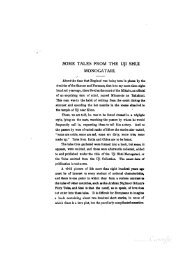Chau Ju-Kua - University of Oregon Libraries
Chau Ju-Kua - University of Oregon Libraries
Chau Ju-Kua - University of Oregon Libraries
Create successful ePaper yourself
Turn your PDF publications into a flip-book with our unique Google optimized e-Paper software.
1,44 KOREA. 169<br />
chong-Tcuan period (A. D. 627— 650) and served as tlie basis for tlie Ta-T'ang K'ai-yiian-li<br />
^° i'^ ^ ^ TC Jis)<br />
^^^ chapters, publisiied in A. D. 713—742, and described in the<br />
Shi-k'u-ts'tiari-sliu-ts'ung-mu, 82,2. The material from which both these works were compiled is<br />
to be found in Tu-Yu's T'ung-tifin, and in the Li-chi (jjjffi ^) division <strong>of</strong> the T'ang-shu.<br />
5 The phrase <strong>of</strong> our text is taken from T'ang-shu, 220,15*'.<br />
5) Sung-shi, 487,20* says «Their forms <strong>of</strong> punishment are neither barbarous nor cruel;<br />
opfen rebels and those who curse their parents are beheaded, all other criminals are punished<br />
with the heavy bamboo on the ribs. Those who have been condemned to death in the provinces<br />
are sent to the capital, where, every year in the eighth moon, there is a revision <strong>of</strong> criminal<br />
10 cases; capital crimes are commuted to deportation to an island, and other sentences are reduced<br />
or pardons granted)).<br />
6) The Shan-hai-king mentions a ((Country <strong>of</strong> Gentlemen)) where the people wore modest<br />
clothing and carried swords, and who were <strong>of</strong> an amiable disposition and not given to litigation.<br />
Liu An (t B. C. 122) in his Huai-nan-tz'i refers to a ((Country <strong>of</strong> Gentlemen in the East)). Pei-<br />
15 w6n-yfln-fu, 102-4,24. Our author bases presuJnably his application <strong>of</strong> this name to Korea on the<br />
use made <strong>of</strong> it by Hing Sh6u during his mission to Korea in A. D. 737 referred to further on (infra,<br />
n. 8) and which is related in T'ang-shu, 220,16*.<br />
7) The information contained in this paragraph, and the previous remarks about examinations,<br />
etc., are derived' from the statements made in A. D. 1015 by the Korean envoy Kuo-<br />
20 Yuan (^K tt'). He said there were neither sheep, hares, camels, buffalo nor donkeys. We have<br />
corrected our author's text accordingly. He said there were two kinds <strong>of</strong> music called h'lt and<br />
hiang. In a subsequent passage (20*) Sung-shi states that there were two styles <strong>of</strong> music in Korea,<br />
the right and the left style; the right style is called T'ang-yo[^ ^)°^ ((Chinese musio), the<br />
left Mang-yo (W& ^) or "Tillage musicn is their old music. Conf. infra, p. 171, line 10, Kuo-<br />
25 Yuan said that his countrymen did not use cash, but only stuffs and rice for purposes <strong>of</strong> barter.<br />
Sung-shi, 487,17 et seqq. under date A. D. 1164, says that in Korea rice and cloth were used to<br />
barter with, for, though there was copper in the country, they had not known how to cast cash,<br />
and had hoarded in their storehouses that which came from China. After the ts ung-ning/peTioi<br />
(A. D. 1102—1106) they learnt how to cast cash, and they had three denominations.<br />
30 8) It was in A. D. 737 that Hing Sh6u was sent on a mission <strong>of</strong> condolence to Korea on<br />
the death <strong>of</strong> Hing-kuang (^ ^), king <strong>of</strong> Sin-lo. When the deceased king's son Ch'ong-k'ing<br />
ascended the throne, the envoy was instructed to state in the name <strong>of</strong> the Emperor<br />
i^i 1^)<br />
that Sin-lo was styled the ((Country <strong>of</strong> Gentlemen)), because its people understood poetry and<br />
literature, and that, as Hing Sh6u was deeply versed in literary matters, He had chosen him as<br />
35 His envoy so that he might discuss with them the meaning <strong>of</strong> the Classics, and impress them with<br />
the mental superiority <strong>of</strong> the Great Country.<br />
9) On the fang-fong or libanotis root, see Bretschneider, Botanicum Sinicum, III, 76—79.<br />
Fai-fu-tzi (the second character is usually written [Jj^) is an <strong>of</strong>ficial root, resembling closely<br />
that <strong>of</strong> the Aconitum. Bretschneider, op. cit., 257—258, and Porter Smith, Materia medica,<br />
40 s. v., Aroidese. Fu-ling a funguslike substance used medicinally by the Chinese. It is the Pachyma<br />
Cocos, Fries, or China-root. It is found also in North America, where it is called «Indian<br />
Breadn. Bretschneider, op. cit., 532—536. ((Serge» is the usual rendering for mau-sU. Sung-<br />
shi, 487,18'', under date A. D. 1164 says that Korea ((is cold and mountainous, the soil is good<br />
for pines (M) and juniper (}jf|[); it produces rice (^Jx,)' '"«* (^)' ^®P ^^^ ^^^^*' ^"* °°<br />
45 Shu (f Jj a glutinous variety <strong>of</strong> Setaria italica, Kth.). They make wine from rice. Silkworms are<br />
rare, and a piece <strong>of</strong> silk (|l|) is worth over ten ounces <strong>of</strong> silver. Clothes are made <strong>of</strong> hempen<br />
cloth. There are several hundred Chinese, mostly from Fu-kien province, living in the capital<br />
(Pyong-yang), who have come there on trading junks)).<br />
10) It may be that these four characters should be translated ((books printed at Foochow)).

















